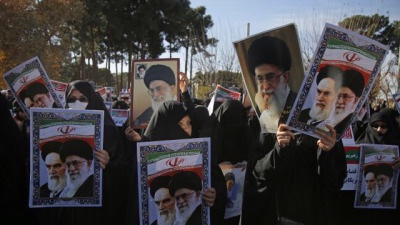 Iran will leave Syria, Iraq only if Baghdad, Damascus want it, aide to Khamenei says
Iran will leave Syria, Iraq only if Baghdad, Damascus want it, aide to Khamenei saysMOSCOW
A top aide to Iranian Supreme Leader Ayatollah Ali Khamenei said on July 13 that Iran would immediately withdraw its “military advisers” from Syria and Iraq only if their governments wanted it to.
“Iran and Russia’s presence in Syria will continue to protect the country against terrorist groups and America’s aggression ... We will immediately leave if Iraqi and Syrian governments want it, not because of Israel and America’s pressure,” said Ali Akbar Velayati in a conference in Moscow.
Iran and Russia back Syrian President Bashar al-Assad in the country’s civil war.
Velayati met Russian President Vladimir Putin, as part of a diplomatic offensive by Tehran as it braces for renewed U.S. sanctions.
The meeting was “very constructive and friendly,” he told Iranian state television from Moscow.
“Putin underlined the importance of political and defense cooperation between Iran and Russia in Syria. Soon the presidents of Iran, Russia and Turkey will attend a summit in Tehran,” said Velayati, who is expected to visit China shortly.
Trump and Putin are expected to discuss Iran’s regional role and the Syrian conflict at a summit in Helsinki on July 16.
The Kremlin said Putin and Velayati discussed the situation in Syria and bilateral relations and Velayati had given Putin messages from Khamenei and from Iran’s president Hassan Rouhani.
Russia, China and the big European powers say they still back a 2015 multinational nuclear deal with Iran, despite U.S. President Donald Trump’s decision to pull out and to reimpose economic sanctions on Tehran that were lifted as part of the accord.
“Putin reiterated that Russia rejects America’s decision to impose sanctions on Iran ... He said Russia will stand by Iran and will defend Tehran’s rights,” Velayati said.
Under the 2015 agreement, Iran strictly limited uranium enrichment capacity to satisfy the powers that it could not be used to develop atomic bombs. In exchange, Iran received relief from sanctions.
U.S. officials said in June they would push countries to reduce their Iranian oil imports to zero. However, U.S. Secretary of State Mike Pompeo said on July 10 that Washington would consider requests from some countries to be exempted from sanctions it will put in effect in Nov. 4.
Tehran has been pushing hard to hold output steady amid U.S. sanctions that are expected to hit its exports, pressuring other signatories of the deal to come up with a package of economic measures to salvage the deal.
“Putin said that Russia is prepared to continue its oil investment in Iran at the level of $50 billion. It means Russia is ready to invest this amount in Iran’s oil sector,” Velayati said.
“This is an important amount that can compensate for those companies that have left Iran (amid U.S. sanctions fear),” Velayati said, in a reference to a number of firms, wary of U.S. sanctions, that have already said they plan to pull out of Iran’s market.
He said one of Russia’s major oil companies has signed a $4 billion deal with Iran, which he said “will be implemented soon,” without elaborating.
No comments:
Post a Comment